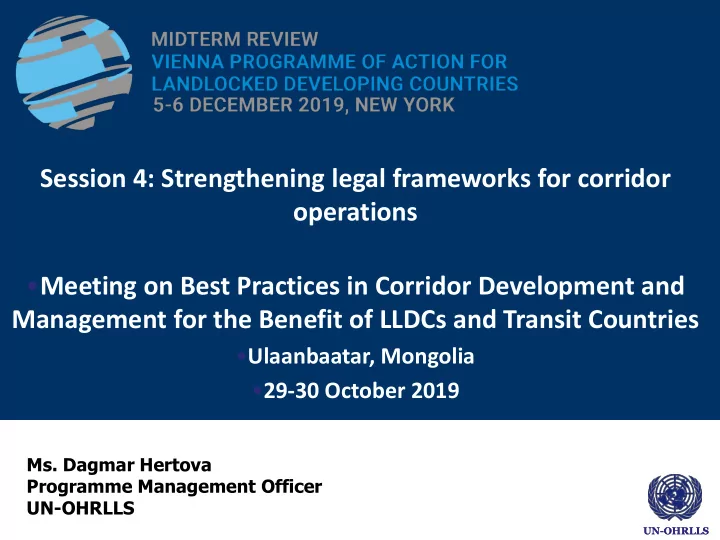

Session 4: Strengthening legal frameworks for corridor operations • Meeting on Best Practices in Corridor Development and Management for the Benefit of LLDCs and Transit Countries • Ulaanbaatar, Mongolia • 29-30 October 2019 Ms. Dagmar Hertova Programme Management Officer UN-OHRLLS UN-OHRLLS UN-OHRLLS
Legal framework for transit and LLDCs More efficient and effective border and customs controls Simplified and standardized procedures Recognized transit documents Faster, safer and more reliable transport More transparency Enhanced cooperation Trade facilitation measures Lower Transport Costs Fewer Delays Enhanced Connectivity and More Trade for LLDCs Enhanced Competitiveness of LLDCs UN-OHRLLS UN-OHRLLS
International legal instruments on transit transport • International Convention on the Harmonization of Frontier Controls of Goods (1982) • Customs Convention on the International Transport of Goods under Cover of TIR Carnets (“TIR Convention” 1975) • WCO Revised Kyoto Convention (1999) • WTO Trade Facilitation Agreement (2013) UN-OHRLLS UN-OHRLLS
Status of ratifications Convention LLDCs LLDCs Transit Transit (Dec (Oct developing developing 2014) 2019) countries countries (Dec 2014) (Oct 2019) Harmonization 11 12 3 3 Convention TIR Convention 11 11 5 9 Revised Kyoto 15 19 19 22 Convention WTO Trade - 25 - 28 Facilitation Agreement UN-OHRLLS UN-OHRLLS
Regional, sub-regional and bilateral agreements Multilateral and (sub-)Regional Agreements • The Multilateral Agreement on International Transport for Development of the Europe- Caucasus- Asia Corridor • Afghanistan, India and Iran transport and transit corridor agreement • China, Mongolia and Russia Agreement on road transport and trilateral economic partnership for building an economic corridor • ECO Transit Transport Framework Agreement • The Northern Corridor Transit Agreement • The MOU on the establishment of the Dar es Salaam Corridor • Agreement on River Transport for the Paraguay-Paraná Waterway Bilateral Agreements • Mongolia – China Agreement on railway transit transport • Mongolia – Russia Agreement on rail freight transit transport • Nepal – India Transit Agreement; Nepal-China Transit Transport UN-OHRLLS UN-OHRLLS
Scope of transit agreements • Transport infrastructure development and maintenance • Harmonization of formalities, procedures and standards • Simplification and unification of documentation • Preferential arrangements for different categories of cargo • Development of shared information systems • Resources Mobilization UN-OHRLLS UN-OHRLLS
Examples of Corridor Agreements Corridor Name Enabling Instrument Parties to Agreement Northern Corridor Multilateral Agreement Burundi, DRC, Kenya, Rwanda, South Sudan, Uganda Central Corridor Multilateral Agreement Burundi, DRC, Rwanda, Tanzania, Uganda Dar es Salaam Corridor Constitution DRC, Malawi, Tanzania, Zambia Bilateral Agreement Mozambique, Zimbabwe Beira Corridor Maputo Corridor Company Registration Mozambique, Swaziland, South Africa MOUs Namibia, Botswana, South Africa Walvis Bay Corridor Namibia, Zambia, Congo DR Nigeria, Benin, Togo, Ghana, Cote d’Ivoire Joint Declaration of 5 States Lagos - Abidjan Corridor Cote d’Ivoire , Burkina Faso, Niger Abidjan/Ouagadougou/Niamey Corridor Bilateral Agreements Transport Corridor Europe-Caucasus-Asia Multilateral Agreement Armenia, Azerbaijan, Bulgaria, Georgia, Iran, Kazakhstan, Kyrgyzstan, Moldovia, Romania, (TRACECA) Tajikistan, Turkey, Ukraine and Uzbekistan Multilateral Agreement Iran, Russian Federation, Azerbaijan, Armenia, International North-South Transport Corridor Belarus, Bulgaria, Kyrgyzstan, Oman, (INSTC) Tajikistan, Turkey, Syria and Ukraine. Trans-Caspian East-West Middle Corridor Multilateral Agreement Afghanistan, Azerbaijan, China, Georgia, Kazakhstan, Kyrgyzstan, Turkey and (Trans-Caspian Corridor) Turkmenistan Central Asia/Persian Gulf Transit Transport Ashgabat Multilateral Kazakhstan, Iran, Uzbekistan, Turkmenistan, Agreement Pakistan, India and Oman Corridor Multilateral Agreement Cambodia, China, Laos, Myanmar, Thailand UN-OHRLLS UN-OHRLLS The Greater Mekong Corridors and Vietnam
Key elements for corridor agreements • Corridor Institutional Framework and Governance Structure • Responsibilities of Different Stakeholders • Coordinated Planning and Development of Transport Infrastructure • Corridor Budgetary Resources • Trade and Transport Facilitation Issues • Transport Logistics Monitoring • Stakeholder Coordination • Consultation and Resolution of Bottlenecks • Capacity Building of stakeholders UN-OHRLLS UN-OHRLLS
Thank You Find out more on the midterm review of the Vienna Programme of Action at www.lldc2conference.org/mtr UN-OHRLLS UN-OHRLLS
Recommend
More recommend